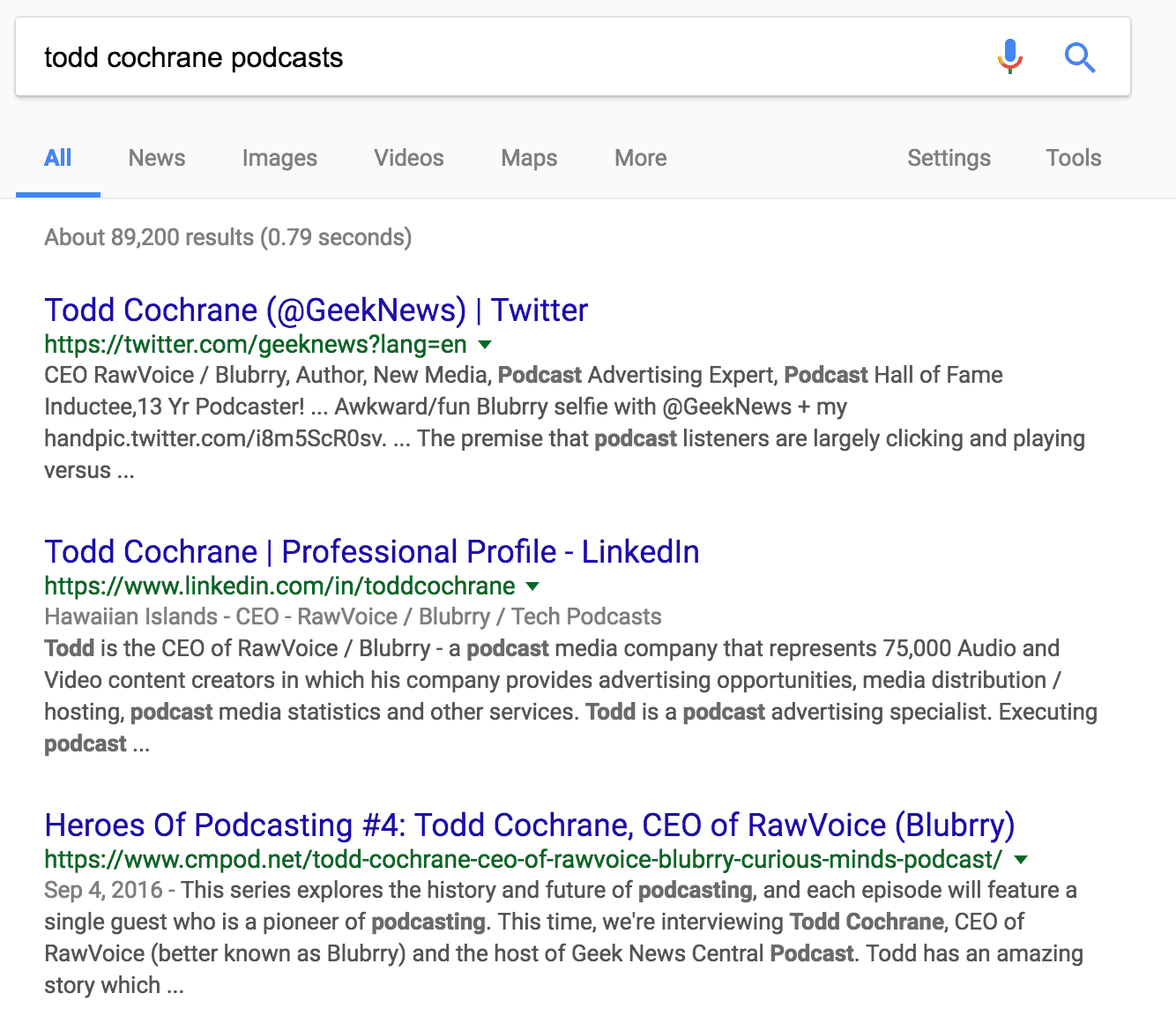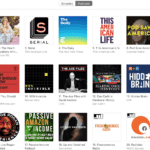Debunking the Podcast Discoverability Myth, Myth

Last updated on March 23rd, 2018
I just read this article by Seth Resler at Jacobs Media Strategies. Basically, the article crowd-sources opinions about the “podcast discovery problem” from people in and around the podcasting space, including folks from Libsyn, Blubrry, Podcast Movement, and several other podcasters. If you’re not interested in sifting through a good amount of bogus thoughts and thinly veiled self-serving product endorsements, here are the most prominent thoughts:
- There is no podcast discovery problem, it’s not real. Only people who don’t have listeners are complaining.
- The real issue isn’t podcast discovery, it’s _____ (podcast growth, education, technology, etc.)
- The big podcasts are known, what’s the problem?
Related reading: The Podcast Discoverability Problem
Blubrry CEO, Todd Cochrane
My absolute favorite terrible opinion comes from Blubrry CEO, Todd Cochrane. “Podcasts having a discoverability problem is honestly a myth. You can Google any of the five shows that I produce and they will be at the top of (sic) near the top of the Google search results.” He follows it up later with “Word of mouth remains the #1 way podcast are discovered.”
Just Google It
Ok, so let’s tackle this quote in two chunks. First off, the opening statement is so far off the rails, misguided, and out of touch that I honestly begin to question Blubrry’s position in the market if they’re being led by someone who opens with this thought when posed the question. Yes, if you Google some oddly specific podcast name it’ll likely be near the top of the results. This isn’t new, nor is it the problem. If you already know what you’re searching for, it’s not an act of discovery as much as you’re simply looking it up. As someone who’s unfamiliar with Todd Cochrane, and doesn’t know the podcasts he apparently produces, I actually did a Google search for “todd cochrane podcasts”. This, since I don’t quite know what I’m looking for, would be considered a discovery search (or more formally: informational query; more on this later). For true authenticity, I did the search in an incognito browser with no search history skewing the results.

Guess what? There’s absolutely no mention of one (let alone five) of the podcasts Todd produces. The results seem focused on driving his own personal brand. But this didn’t deter me. I did find later down he hosts a podcast called Geek News Central. Still no mention of the other four podcasts he produces, but we’ll leave that alone (I’m not quite convinced they exist, tbh).
Ok so let’s run a petty experiment. Let’s say you want to find a podcast like Geek News Central, but you’re not sure of the name. Since again, searching for “geek news central” isn’t discovering a podcast because you would already know it exists.
So, I’m going to run a couple tests trying to put myself in the role of the searcher with the end goal to find Geek News Podcast. Throwing “geek” “news” “central” into a thesaurus and searching for the newly created name isn’t quite fair, despite being a semi-decent proxy. Sorry, Weirdo Account Paramount podcast. So what I did, to be more fair, was to replace one word and see where Geek News Central appeared in the search results. The most obvious choice, and my first test, was to Google “nerd news central”. I ran it through a rank checker tool which shows you which page any specific domain would appear. geeknewscentral.com, the homepage of Cochrane’s podcast, has one page (not about the podcast) buried on page 3. The podcasts iTunes link — typically the highest ranked page for most podcasts — didn’t appear on any page.
My next test is searching for “nerd news podcast”. I think using the term “central” still leans on the you-already-know-what-you’re-looking-for end of the spectrum. I went through five pages of Google results with nothing related to the Geek News Central showing up.
Searching for anything starting with “geek news” will first bring up Cochrane’s Twitter page (his handle is @geeknews), and sometime later geeknewscentral.com will appear. What can I say, he is very good at personal branding. Where Cochrane gamed the system is his podcast name (and Twitter handle) are both named after informational queries. Information queries are the terms you look up when you’re discovering something and looking for more information. For example, if you named your podcast News Podcast and landed newspodcast.com and @NewsPodcast as your Twitter handle, unsurprisingly, you’d appear in all the search results of people looking for podcasts about the news.
Ok, now how do we find all five podcasts Cochrane mentions in his quote? Again, I went back to the results of “todd cochrane podcasts” to find the answer. In the fifth result, he has a bio on New Media Show that says in addition to Geek News Central, he produces both The New Media Show and Podcast Legends. Alright, now we’re getting somewhere. We now have three accounted for podcasts.
After searching for a bit and at least a few pages of Google results, I still couldn’t find the other two mysterious podcasts Cochrane produces. Is this evidence of a podcast discovery problem? Finally, I went to the digital version of snail mail to find the answer, I tweeted Cochrane. No response.
@GeekNews hi todd — what podcasts do you produce?
— Discover Pods (@Discover_Pods) December 18, 2017
Update:
? Geek News Central, New Media Show, Podcast Legends, Your Podcast, PowerPress Podcast.
— Todd Cochrane (@GeekNews) December 19, 2017
The Elusive Word of Mouth
Ok, now onto the second part of Cochrane’s quote: “Word of mouth remains the #1 way podcast are discovered.”
Yes, word of mouth is the #1 way podcasts are discovered …. but it shouldn’t be. Or, more fairly, should be one of the several ways podcasts are discovered.
Podcasts often get compared to blogs for a variety of reasons. The easiest comparison is because they’re both creative outlets, with relatively low barriers of entry, and widely available to (the potential of) a large audience.
The biggest difference between the two mediums is … wait for it … discoverability.
In the aforementioned Resler article, I believe Ravi Jayagopal is the closest to nailing the problem, “The indexing of audio content is still practically non-existent.” Indexing, I believe in this case, is referring to being crawled and cataloged by a search engine in order for prospective listeners to find it. A blog, by nature, is constantly indexed and every word that’s typed will be crawled by Google, put into an algorithm, and ultimately displayed in search results. Audio content doesn’t have the same luxury. Some blogs own a website, post show notes (or even transcriptions <– do this, podcasters), and very rarely have written content. They’re at an extreme disadvantage here. Google is the undisputed leader of all things discovery. If you don’t show up in results here — talking about informational queries in this case — you won’t be discovered by the largest audience on the planet, simple as that.
The other way blogs don’t have as big of a discoverability problem is through sharing. Though word of mouth still remains a high driver of discoverability, blogs also facilitate this in a number of ways, most notably social sharing. When was the last time you went on a website that didn’t have Facebook and Twitter buttons prompting you to share what you’re reading? When you listen to a podcast, whether it’s through Apple Podcasts, Google Play, Overcast, or other apps, there might be a way to share what you’re listening to, but often times it’s either buried, nonexistent, or remains an afterthought.
So without a conversation facilitator, podcasts are recommended through word of mouth, but only in limited silos or when a prospective listener takes an active approach to find something new. Jayagopal reiterates this point, stating “So podcasters currently get no help with finding new listeners through organic searches, and have to rely on word-of-mouth recommendations from listeners, and we’re not yet at the point where people are recommending podcasts on their Facebook or Twitter accounts.”
Most decent blogs have a healthy mix of referral traffic from organic Google searches to all the major social networks. Often, direct traffic is a very minimal percent of a blog’s overall traffic. At this stage of the podcast growth cycle, direct traffic accounts for a disproportionate percentage of a majority of podcasts traffic and listeners. The good news podcasters, is the direct traffic you’re getting now is only the tip of the iceberg if podcasts follow a similar trajectory as blogs.
The Podcast Discoverability Myth, Myth
I’ve mentioned this before, but it bears repeating: there is a podcast discoverability problem, it’s very very real.
The sheer fact that I couldn’t find the podcasts of a guy who claims his podcasts don’t have a discoverability issue should probably raise some flags. I’m sure Todd Cochrane is a smart man and the success of Blubrry is unquestionable. However, I think he’s entirely off base and far removed from the actual podcast discoverability problem.
Without podcasts being readily available on Google*, the lack of comfortability sharing on social media, and no true ways to facilitate word of mouth have all led podcasts being consumed and recommended in silos.
*I know some very smart and talented people are working on supplemental search engines for podcasts. While I like what they’re doing and hope it takes off, ultimately Google needs to be the discovery source.
I speak to tons of podcasters on a daily basis and the discoverability problem is a very real issue. Earlier this year, we surveyed over 500 people with the 2017 Podcast Trends Report and 71.2% of people consider podcast discovery as a major issue facing podcasts today.
I don’t have hard data to back this next claim up, but I’ll assume the leading podcast recommendation channel is currently the iTunes charts. If this is the case — and again I’m assuming — then the leading podcasts are in a self-perpetuating cycle which I’ve outlined in a number of places. The rich are getting richer.













7 Comments
You’re so right about this. I know some people feel it is a myth, but maybe we don’t mean ‘discoverability’ but ‘introductions’? If we know a podcast exists we can usually find it, but even as someone who should know what’s out there I still miss out on things. Mobile Apps do some of the work, as do newsletters. The biggest problem is around data, as we all know that the charts are skewed towards anyone with the ability the market their show in old media. This means anything that’s already big will stay big, and anything smaller will need time, luck and an audience willing to spread the word.
Agree, there’s always more that can be done. Websites, newsletters, online communities, reddit, etc. all help facilitate and bring awareness about podcasts but without proper indexing these will remain the main drivers. As for the charts, I think we’re aligned in our thinking. If a person goes to the podcast charts to find a new podcast, that podcast gets a new listener and stays on top of the charts. Rinse. Repeat.
Great article, Kevin! I totally agree. I started the Active Travel Adventures podcast late September. I thought, “Score!” when I was able to get not only my website of the same name, but these key words as my podcast name. Yet if you search for ‘Adventure Travel’ on iTunes, I don’t pop up, although I do pop up on ‘Active Travel’. I’ll be glad when the search is improved. Transcriptions are a pain, but Ive been doing them for the website. Thanks again for a great article!
Hi Kit — great to hear! Yeah, I think transcriptions, though a pain and/or expensive at least help your podcast get indexed a bit more. If Apple, or more likely Google, begin to index and catalogue podcasts in a similar manner they do videos (ie YouTube), then we’ll be in better shape.
I saw your mention of this in the Slack group and came over to read it. I agree with you on most all points. Having also read Seth’s piece I agree that something about it was off putting. Quotes from individuals with no analysis or context around those quotes from the writer gave me no new information or ways of thinking. I applaud a polite discourse and all of the people who take the time to write about podcasts. The conversation is so important for the medium. Nice rant, I dig your passion.
Thanks Allyson!
Great article Kevin. Can I get a #TRUTH!?
Comments are closed.